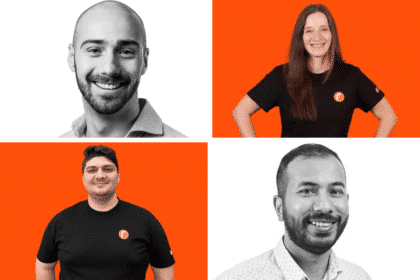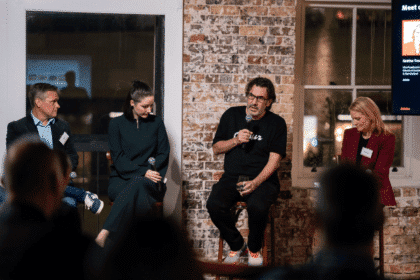Maree McDonough joined Leo Burnett back in 1985, working below figures such as John Sintras and our very own Greg ‘Sparrow’ Graham. Nearly 40 years later, McDonough is still working in advertising as one of the co-founders of training and development firm The Hummingbirds.
Lead image: McDonough and some of the team at the GroupM Emmies in 2013.
B&T caught up with McDonough, speaking on behalf of the Experience Advocacy Taskforce, to learn about the past, present and future of the industry.
Take the pledge and show support by signing EAT’s Change.org petition.
B&T: Why is it important for the advertising industry to embrace experience and experienced members of staff as much as it embraces newness?
Maree McDonough: One of my favourite quotes is from Oscar Wilde who said, “Experience is simply the name that we give mistakes.” Therefore, the more experience you have, the more mistakes you’ve made.
The caveat is, of course, that you learn from the mistakes and don’t make the same ones again. But to me, the learnings you acquire over the years of experience make you quicker and better at what you do. It gives you perspective and makes you a more astute decision-maker — and we have to make a lot of decisions in this industry. It also gives you a gravitas which means when you say yes, you mean yes. When you say no, you mean no. And all of that saves everyone energy, time and money.

An old boss of mine, Genelle Sharples, said to a new starter in our team on their first day, “I’ll tell you every mistake I have made. So you don’t make the same mistakes. You can go away and make your own mistakes and learn from them. But I’m gonna tell you mine.”
I often say that to people when they are managers and they have someone who’s struggling with a task. “Well, what did you do? You know, what were the mistakes you made when you were doing that task? Tell them the mistakes you made.”
When we do not embrace experience it means there is a lack of learning and our industry is about how learnings are applied to be better in the future.
That’s one of the answers. The other is around trust and experience builds trust. And that’s the basis of any strong relationships and we are in the services industry. So relationships are key and they take time to build.
B&T: Why does advertising seem to prioritise youth and newness?
MM: A lot of people leave the industry and there’s always a lack of supply of people. It’s a cost scenario to a degree as well and businesses are under tight margins and unfortunately when times are tough those who are earning more money tend to be the ones that leave. But to me, if you’ve got the will, you can learn the skill. Skills can be taught. It’s more around the attitude and the will of the people that is important.
B&T: Could you just kind of give us I guess, just the skinny on your kind of career?
MM: I started in the industry at Leo Burnett in 1985. Sparrow was one of the bosses as were John Sintras and Allen Scash. I joined as a media assistant. I deferred uni for a year and thought I’d get a job as my father had been in the industry and I liked the idea of it.

I worked at Burnetts for about five years, then I travelled overseas as everyone did back in those days, and had a year off, came back and worked at Clemenger for six years and then had another sabbatical. I came back when Mindshare had just started and went into a freelance client role there. A few years in, my freelance role became permanent and there was the opportunity to do training as part of the role. with almost 20 years of experience, it was a natural opportunity that made that arose. Of course, this was on top of my day job. Sharples had just been appointed as the regional head of training. So we had a training person in every office and it was a great opportunity just to learn different skills. It helped with my day job, but it also helped the office put together a training plan. I really enjoyed it and it was an opportunity to just use my experience to help others.
It gave me exposure to regional markets and APAC as there was a trainer in each office. We met once a year at a conference where we upskilled and shared. In 2006, I was offered a full-time role in Hong Kong training staff across the region. A couple of years later, I moved back to Sydney and I did the job from Australia for the next 10 years. It was the best job in the world.
Then in 2017, a recalibration of WPP meant that I would have to move to Singapore which I wasn’t prepared to do. So with these skills and Linda [Robson], we started The Hummingbirds and we had the blessing of GroupM. The churn of the industry helped us at that stage! Different agencies were very happy that we could train their staff as well. I think 100 per cent of our business has been word of mouth.
B&T: What learning and development do you offer and who do you work with now?
MM: It’s really broad. We have worked with most of the main holding company media agencies, some of the advertising agencies and some media owners. Some clients as well and the indies. We’re also starting to broaden outside the industry but that’s where we started as we spent so long in the sector.
We always like to tell stories and build case studies and examples. Plus the stories are relatable so people walk away from the training and they think ‘I get it.’
B&T: If I had to put you on the spot and dispense one lesson, mantra or piece of advice, what would it be?
MM: Can I have two? I don’t own them. We always say steal with pride. I really believe that we teach people how to treat us. So when people are feeling frustrated about responding to something with a quick turnaround or accepting a fee that doesn’t cut it, it’s usually because you’ve accepted it. And in doing so we’ve taught that person, client or colleague, that they can treat us in that way and that’s okay.
The other one is that responses are the best way to evaluate the effectiveness of your communication. We are in the communication business. So if we’re not getting the response we want without communication then we need to change it because it’s not the other person’s fault that they’re not getting it. It’s our fault for not communicating in a way that helps them understand. I remember learning this and delivering some training one day and a person wasn’t getting it and then instead of thinking it’s about them, I thought what do I change so that this person gets it?
B&T: What’s the best piece of advice you’ve been given by someone in the industry and by whom?
MM: I told Sintras this a while ago and I don’t think he remembered it. But he was one of my bosses when I worked at Leo Burnett in the late 80s. I remember having to admit a mistake to him. I was only 19 or 20, and I thought I’d made a huge mistake and there wasn’t going to be our ad on Sunday night during 60 Minutes. I went to John and admitted this mistake. And he said, ‘Look, Maree, what’s the worst thing that can happen?’
I remember thinking, well, I could lose my job. And he said, ‘Yeah, exactly.’
‘No one is going to get hurt. No one’s going to die from this mistake you’ve made,’ he said.
Sintras’ advice gave me such a good perspective on life at a young age.
B&T: What change in the industry has surprised you most over your career?
MM: This is an interesting question. For me, it’s the reluctance of so many to come back to the office after COVID. It’s quite a contentious thing at the moment, but it just surprises me that people would rather work from home than be in the office. And that’s a big change from my time working in the office because I used to love coming into the office through my agency career. I used to love the exposure you got from so many great minds, I used to love it when my boss was in the office because you always learned something, you learned something from hearing conversations and phone calls, just sitting next to your boss and watching them do it.
Back in those days, 100 per cent of your learning was on the job, as we didn’t get any off-the-job learning. It was just so dynamic. You’d have reps coming in just spontaneous opportunities arising that just couldn’t happen if you’re working at home on your own. There was a lot of camaraderie and I made lifelong friends from agencyland, media suppliers and clients as well.

There’s a model, the 70/20/10 learning model and about 10 per cent of your learnings off the job, 70 per cent is experience and 20 per cent is feedback. There are a lot of incidental opportunities to learn and be noticed by others, not just in your team. I recently spoke to a colleague in Japan and they’re just discovering big knowledge gaps with their people because they work from home a lot.
So it is a surprise. And then these people are so young and I think, ‘Gosh, why don’t you want to be in the office just for the diversity of people you meet?’ I get the travel and all that. But it should cancel it out because you get so much more when you’re in there.
B&T: Where do you see your career heading and developing over the coming years?
That’s very nice question to ask someone who’s almost 57 years old. It’s more of the same. I see it in the feedback we get how much it helps people to hear the stories and the advice we give. Like I said, sharing my mistakes, my learnings and experiences — that’s the thing that people love about The Hummingbirds’ workshops, that we come from the business, we get it.









